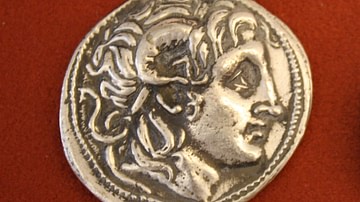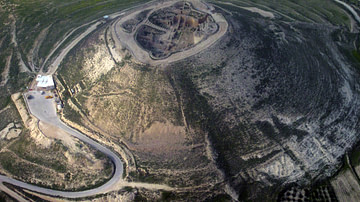Search
Search Results

Definition
The Seven Wonders
The Seven Wonders of the Ancient World were seven impressive structures famously listed by ancient writers including Philo of Byzantium, Antipater of Sidon, Diodorus Siculus, Herodotus, Strabo, and Callimachus of Cyrene, among others. The...

Definition
Phocion
Phocion (c. 402 – 318 BCE) was an Athenian statesman and military commander who, according to tradition, was made a general a staggering 45 times. A student of Plato and known as 'the Good', his political position was somewhat ambiguous...

Definition
Demetrius I of Macedon
Demetrius I of Macedon, also known as Demetrios Poliorcetes, the 'Besieger' (c. 336 - c. 282 BCE), was a Macedonian king who, along with his father Antigonus I, fought for control of Alexander the Great's empire in the 'Successor Wars'. After...

Definition
Hellenistic Warfare
When Alexander the Great died in 323 BCE, he left behind an empire devoid of leadership. Without a named successor or heir, the old commanders simply divided the kingdom among themselves. For the next three decades, they fought a lengthy...

Definition
Seleucus I Nicator
Seleucus I Nicator (l. c. 358-281 BCE, r. 305-281 BCE) was one of the generals of Alexander the Great (l. 356-323 BCE) who made up the group of Diadochi ("successors") who divided the vast Macedonian Empire between them after the death of...

Article
Alexander the Great as a God
The age-old concept of the “divine right of kings” allowed that a country's ruler received his or her power or authority from God. However, few, if any, were delusional enough to actually believe themselves to be a god. An exception to this...

Definition
Macedon
Macedon was an ancient kingdom located in the north of the Greek peninsula first inhabited by the Mackednoi tribe who, according to Herodotus, were the first to call themselves 'Hellenes' (later applied to all Greeks) and who gave the land...

Definition
Herod the Great
Herod I, or Herod the Great (c. 75 – 4 BCE), was the king of Judea who ruled as a client of Rome. He has gained lasting infamy as the 'slaughterer of the innocents' as recounted in the New Testament's book of Mathew. Herod was, though, a...

Definition
Telesilla of Argos
Telesilla of Argos was a lyric poet of the 5th century BCE, listed by Antipater of Thesalonike (c. 15 BCE) as one of the great Nine Female Lyric Poets of Greece (along with Praxilla, Moiro, Anyte, Sappho, Erinna, Corinna, Nossis, and Myrtis...

Definition
Aetolian League
The Aetolian League was an ancient Greek alliance of the tribes that lived west of Athens and north of the Peloponnese. The league was probably first established in the early 4th century BCE, reached its peak during the Hellenistic Period...